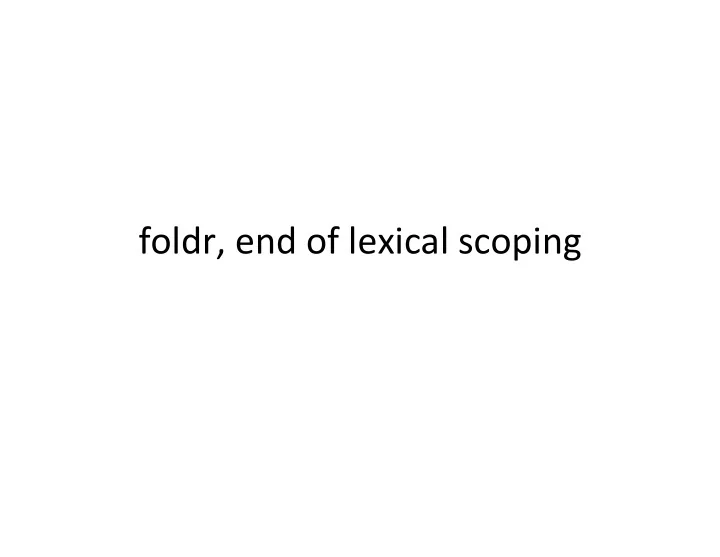

foldr, ¡end ¡of ¡lexical ¡scoping ¡
Review ¡of ¡foldr ¡ foldr ¡(some6mes ¡also ¡called ¡accumulate, ¡reduce, ¡or ¡inject) ¡is ¡ another ¡very ¡famous ¡iterator ¡over ¡recursive ¡structures ¡ ¡ Accumulates ¡an ¡answer ¡by ¡repeatedly ¡applying ¡ f ¡to ¡answer ¡so ¡far ¡ – (foldr f base (x1 x2 x3 x4)) ¡computes ¡ (f x1 (f x2 (f x3 (f x4 base)))) (define (foldr f base lst) (if (null? lst) base (f (car lst) (foldr f base (cdr lst))))) – This ¡version ¡“folds ¡right”; ¡another ¡version ¡“folds ¡leD” ¡ – Whether ¡the ¡direc6on ¡maFers ¡depends ¡on ¡ f ¡(oDen ¡not) ¡ ¡
Examples ¡with ¡foldr ¡ These ¡are ¡useful ¡and ¡do ¡not ¡use ¡“private ¡data” ¡ (define (f1 lst) (foldr + 0 lst)) (define (f2 lst) (foldr (lambda (x y) (and (>= x 0) y)) #t lst)) These ¡are ¡useful ¡and ¡do ¡use ¡“private ¡data” ¡ (define (f3 lo hi lst) (foldr (lambda (x y) (+ (if (and (>= x lo) (<= x hi)) 1 0) y)) 0 lst)) (define (f4 g lst) (foldr (lambda (x y) (and (g x) y)) #t lst))
Lexical ¡scoping ¡vs ¡dynamic ¡scoping ¡ • The ¡alterna6ve ¡to ¡lexical ¡scoping ¡is ¡called ¡ dynamic ¡scoping. ¡ • In ¡dynamic ¡scoping, ¡if ¡a ¡func6on ¡f ¡references ¡a ¡ non-‑local ¡variable ¡x, ¡the ¡language ¡will ¡look ¡for ¡x ¡ in ¡the ¡func6on ¡that ¡ called ¡f. ¡ – If ¡it's ¡not ¡found, ¡will ¡look ¡in ¡the ¡func6on ¡that ¡called ¡ the ¡func6on ¡that ¡called ¡f ¡(and ¡so ¡on). ¡ • Contrast ¡with ¡lexical ¡scoping, ¡where ¡the ¡language ¡ would ¡look ¡for ¡x ¡in ¡the ¡scope ¡where ¡f ¡was ¡ defined . ¡
Why ¡lexical ¡scope? ¡ 1. Func,on ¡meaning ¡does ¡not ¡depend ¡on ¡variable ¡names ¡used ¡ Example: ¡Can ¡change ¡body ¡to ¡rename ¡a ¡variable ¡ q ¡instead ¡of ¡ x – Lexical ¡scope: ¡guaranteed ¡to ¡have ¡no ¡effects ¡ Dynamic ¡scope: ¡might ¡change ¡func6on ¡ (define (f y) (let ((x (+ y 1))) (lambda (z) (+ x y z))) ¡ When ¡the ¡anonymous ¡func6on ¡that ¡f ¡returns ¡is ¡called, ¡in ¡lexical ¡ scoping, ¡we ¡always ¡know ¡where ¡the ¡values ¡of ¡x, ¡y, ¡and ¡z ¡will ¡be ¡(what ¡ frames ¡they're ¡in). ¡ ¡With ¡dynamic ¡scoping, ¡x ¡and ¡y ¡will ¡be ¡searched ¡for ¡ in ¡the ¡func6ons ¡that ¡called ¡the ¡anonymous ¡func6on, ¡so ¡who ¡knows ¡ where ¡they'll ¡be. ¡
Why ¡lexical ¡scope? ¡ 1. Func,on ¡meaning ¡does ¡not ¡depend ¡on ¡variable ¡names ¡ used ¡ Example: ¡Can ¡remove ¡unused ¡variables ¡in ¡lexical ¡scoping ¡ – Dynamic ¡scope: ¡May ¡change ¡meaning ¡of ¡a ¡func6on ¡(weird) ¡ (define (f g) (let ((x 3)) (g 2))) – You ¡would ¡never ¡write ¡this ¡in ¡a ¡lexically-‑scoped ¡language, ¡ because ¡the ¡binding ¡of ¡x ¡to ¡3 ¡is ¡never ¡used. ¡ • (No ¡way ¡for ¡g ¡to ¡access ¡this ¡par6cular ¡binding ¡of ¡x.) ¡ – In ¡a ¡dynamically-‑scoped ¡language, ¡g ¡might ¡refer ¡to ¡a ¡non-‑local ¡ variable ¡x, ¡and ¡this ¡binding ¡might ¡be ¡necessary. ¡
Why ¡lexical ¡scope? ¡ 2. ¡ ¡Easy ¡to ¡reason ¡about ¡func,ons ¡where ¡they're ¡ defined. ¡ ¡ (define x 1) (define (f y) ¡ (+ x y)) ¡ (define g (let ((x "hello")) ¡ (f 4)) ¡ Example: ¡Dynamic ¡scope ¡tries ¡to ¡add ¡a ¡string ¡to ¡a ¡number ¡ (b/c ¡in ¡the ¡call ¡to ¡(+ ¡x ¡y), ¡x ¡will ¡be ¡"hello") ¡
Why ¡lexical ¡scope? ¡ 3. Closures ¡can ¡easily ¡store ¡the ¡data ¡they ¡need ¡ – Many ¡more ¡examples ¡and ¡idioms ¡to ¡come ¡ (define (gteq x) (lambda (y) (>= y x))) (define (no-negs lst) (filter (gteq 0) lst)) The ¡anonymous ¡func6on ¡returned ¡by ¡gteq ¡references ¡a ¡non-‑local ¡ • variable ¡x. ¡ ¡ ¡ In ¡lexical ¡scoping, ¡the ¡closure ¡created ¡for ¡the ¡anonymous ¡func6on ¡will ¡ • point ¡to ¡gteq's ¡frame ¡so ¡x ¡can ¡be ¡found. ¡ In ¡dynamic ¡scoping, ¡x ¡would ¡not ¡be ¡found ¡at ¡all. ¡ •
Does ¡dynamic ¡scope ¡exist? ¡ • Lexical ¡scope ¡for ¡variables ¡is ¡definitely ¡the ¡right ¡default ¡ – Very ¡common ¡across ¡languages ¡ • Dynamic ¡scope ¡is ¡occasionally ¡convenient ¡in ¡some ¡ situa6ons ¡ – So ¡some ¡languages ¡(e.g., ¡Racket) ¡have ¡special ¡ways ¡to ¡do ¡it ¡ – But ¡most ¡don’t ¡bother ¡ • Historically, ¡dynamic ¡scoping ¡was ¡used ¡more ¡frequently ¡in ¡ older ¡languages ¡because ¡it's ¡easier ¡to ¡implement ¡than ¡ lexical ¡scoping. ¡ – Strategy: ¡Just ¡search ¡through ¡the ¡call ¡stack ¡un6l ¡variable ¡is ¡ found. ¡ ¡No ¡closures ¡needed. ¡ – Call ¡stack ¡maintains ¡list ¡of ¡func6ons ¡that ¡are ¡currently ¡being ¡ called, ¡so ¡might ¡as ¡well ¡use ¡it ¡to ¡find ¡non-‑local ¡variables. ¡
Iterators ¡made ¡beFer ¡ • Func6ons ¡like ¡ map ¡and ¡ filter ¡are ¡ much ¡more ¡ powerful ¡thanks ¡to ¡closures ¡and ¡lexical ¡scope ¡ • Func6on ¡passed ¡in ¡can ¡use ¡any ¡“private” ¡data ¡in ¡its ¡ environment ¡ • Iterator ¡(e.g., ¡map ¡or ¡filter) ¡“doesn’t ¡even ¡know ¡the ¡ data ¡is ¡there” ¡ – It ¡just ¡calls ¡the ¡func6on ¡that ¡it's ¡passed, ¡and ¡that ¡ func6on ¡will ¡take ¡care ¡of ¡everything. ¡
Recommend
More recommend